The good folks at SmartDisplayer Technology Co have sent me a six colour eInk badge to play about with.
Here's a quick video and then a walk-through of its features.
You can also view SmartDisplayer's official video.
The Badge
It is a single block of plastic. There are no seams, screws, or rough edges. The ePaper appear right on the surface of the badge, there's no recessing or anything to indicate that this is a high-tech gadget. It uses their "cold lamination" technology which creates an impeccable matt finish.
The display area is 56.4mm x 84.6mm - which is pretty close to the size of a standard credit card - for a resolution of 180PPI.
The eInk
This uses E-Ink Spectra 6 technology. With only 6 colours to play about with there's a lot of dithering needed to make a picture look presentable. Those 6 colours are:
- #000 Black
- #F00 Red
- #0F0 Green
- #00F Blue
- #FF0 Yellow
- #FFF White
I used a standard Monitor Calibration Image, dithered it using the supplied software, and flashed it to the card. I then scanned in the card so you can see exactly how faithful the image reproduction is.
On the left, the eInk. On the right, the original image.
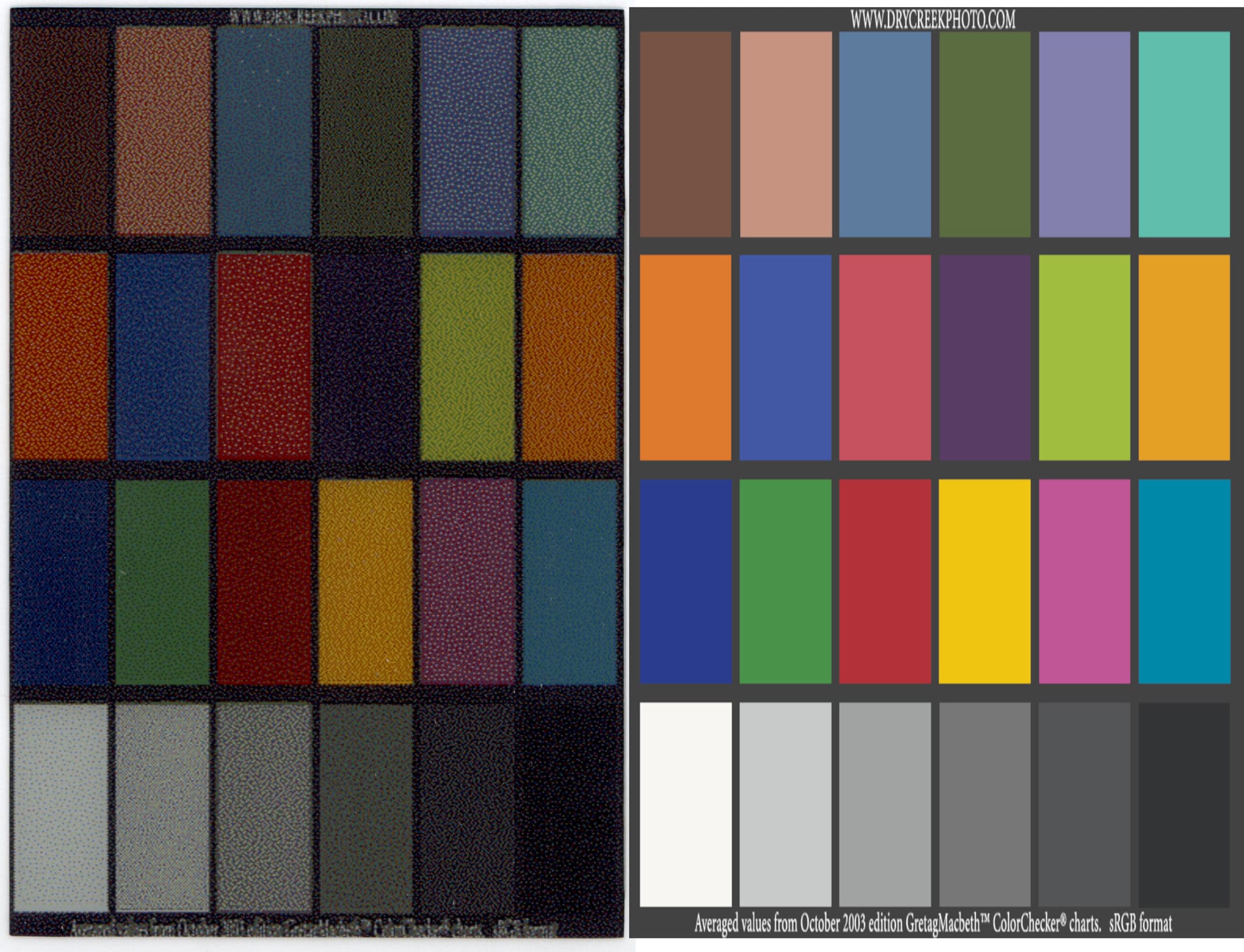
That's pretty bloody good!
Using Bruce Lindbloom's RGB Reference image is also a good way to test a range of colours.
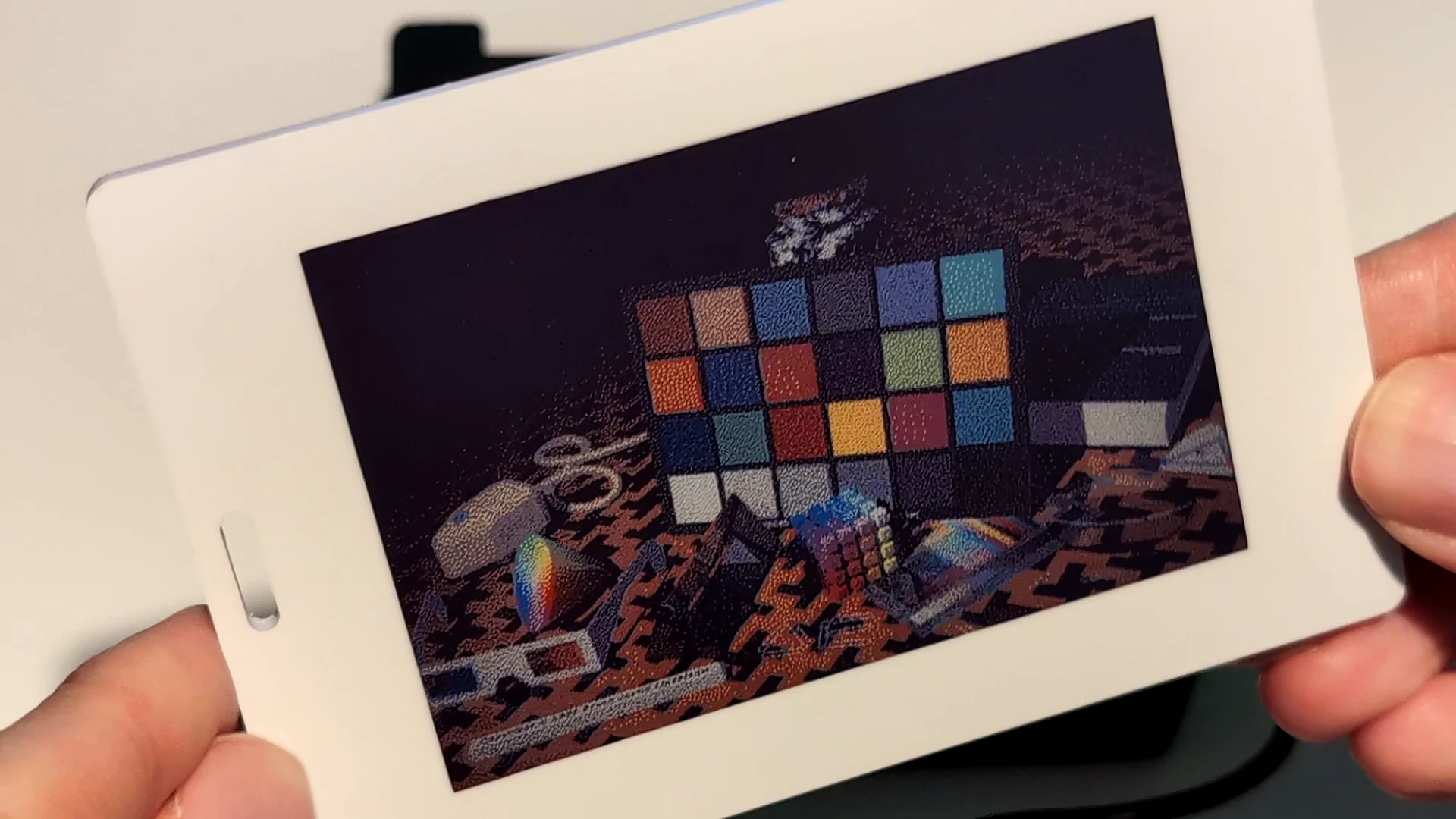 Not bad for red, green, blue, yellow, white, black, eh?
Not bad for red, green, blue, yellow, white, black, eh?
It's hard to find a good test-card with a variety of skin-tones (there's a creepy Getty one with naked women), so I used the Murideo Portrait Reference Photograph. The original:

On eInk:
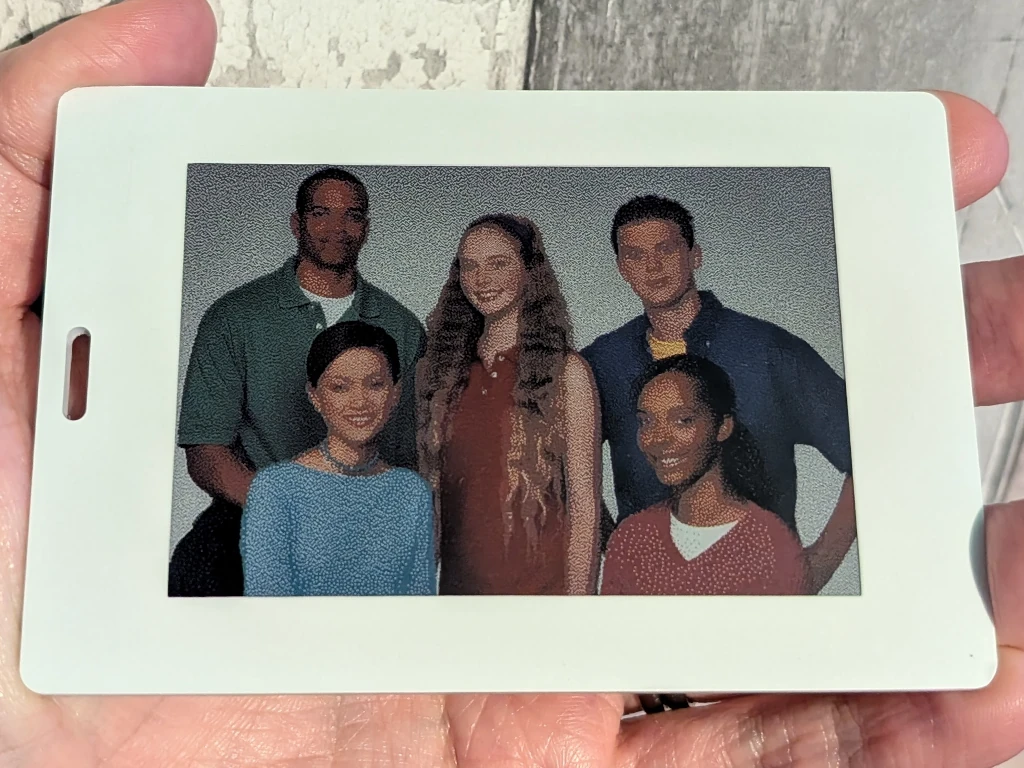
And here's another one:
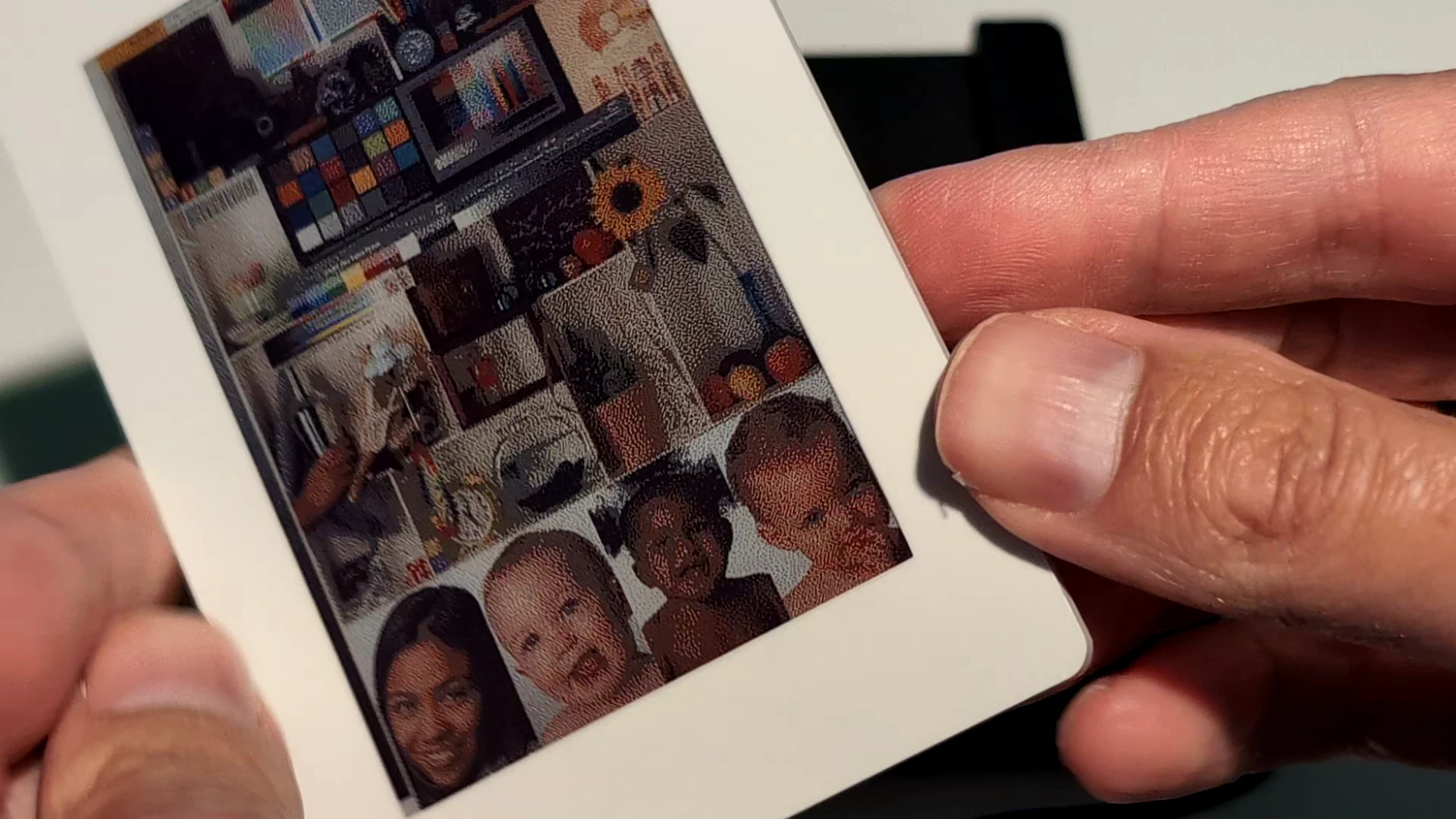
The Card Writer
For Linux nerds, the USB writer showed up as: 1fc9:0102 NXP Semiconductors IT-102MU Reader.
There's almost no information about it other than a brief discussion on an OpenBSD mailing list, and a mention on the CCID database. Apparently it will work as on ChromeOS. It makes a hideous beeping sound when the card is inserted.
Once the card is inserted, two LEDs light up.
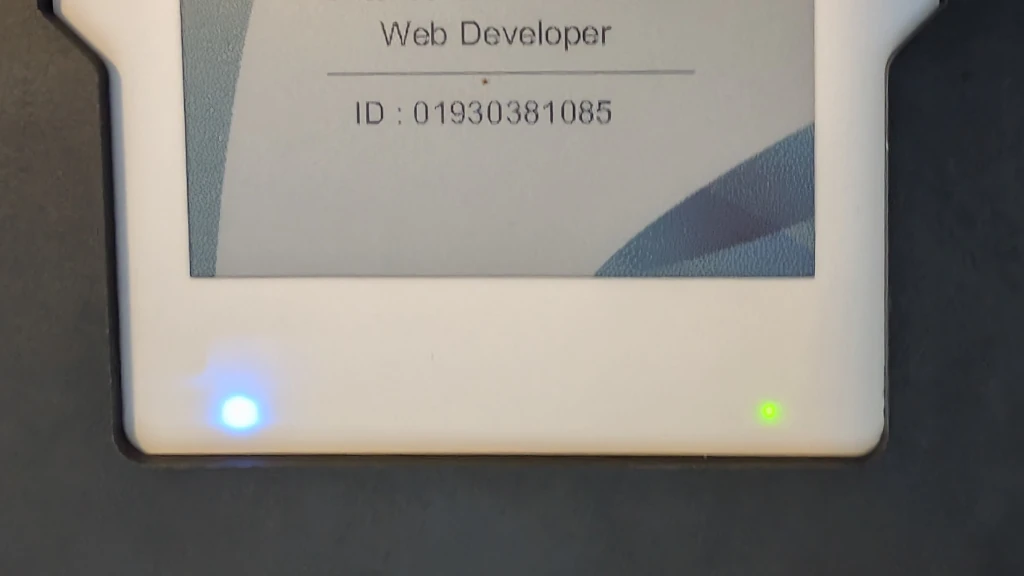
The green one quickly vanishes, but the blue one pulses until the card is removed from the reader.
Detailed
lsusb
Output
Bus 005 Device 084: ID 1fc9:0102 NXP Semiconductors IT-102MU Reader
Device Descriptor:
bLength 18
bDescriptorType 1
bcdUSB 2.00
bDeviceClass 0
bDeviceSubClass 0
bDeviceProtocol 0
bMaxPacketSize0 64
idVendor 0x1fc9 NXP Semiconductors
idProduct 0x0102
bcdDevice 1.12
iManufacturer 1 InfoThink
iProduct 2 IT-102MU Reader
iSerial 3 1.00
bNumConfigurations 1
Configuration Descriptor:
bLength 9
bDescriptorType 2
wTotalLength 0x005d
bNumInterfaces 1
bConfigurationValue 1
iConfiguration 0
bmAttributes 0x80
(Bus Powered)
MaxPower 500mA
Interface Descriptor:
bLength 9
bDescriptorType 4
bInterfaceNumber 0
bAlternateSetting 0
bNumEndpoints 3
bInterfaceClass 11 Chip/SmartCard
bInterfaceSubClass 0
bInterfaceProtocol 0
iInterface 0
ChipCard Interface Descriptor:
bLength 54
bDescriptorType 33
bcdCCID 1.10 (Warning: Only accurate for version 1.0)
nMaxSlotIndex 0
bVoltageSupport 7 5.0V 3.0V 1.8V
dwProtocols 3 T=0 T=1
dwDefaultClock 3685
dwMaxiumumClock 14320
bNumClockSupported 0
dwDataRate 9909 bps
dwMaxDataRate 848000 bps
bNumDataRatesSupp. 0
dwMaxIFSD 254
dwSyncProtocols 00000000
dwMechanical 00000000
dwFeatures 000404BE
Auto configuration based on ATR
Auto activation on insert
Auto voltage selection
Auto clock change
Auto baud rate change
Auto PPS made by CCID
Auto IFSD exchange
Short and extended APDU level exchange
dwMaxCCIDMsgLen 271
bClassGetResponse echo
bClassEnvelope echo
wlcdLayout none
bPINSupport 0
bMaxCCIDBusySlots 1
Endpoint Descriptor:
bLength 7
bDescriptorType 5
bEndpointAddress 0x81 EP 1 IN
bmAttributes 2
Transfer Type Bulk
Synch Type None
Usage Type Data
wMaxPacketSize 0x0040 1x 64 bytes
bInterval 0
Endpoint Descriptor:
bLength 7
bDescriptorType 5
bEndpointAddress 0x01 EP 1 OUT
bmAttributes 2
Transfer Type Bulk
Synch Type None
Usage Type Data
wMaxPacketSize 0x0040 1x 64 bytes
bInterval 0
Endpoint Descriptor:
bLength 7
bDescriptorType 5
bEndpointAddress 0x82 EP 2 IN
bmAttributes 3
Transfer Type Interrupt
Synch Type None
Usage Type Data
wMaxPacketSize 0x0040 1x 64 bytes
bInterval 4
The Software
It is Windows-only software, and it is bare-bones. You can load an image, select if you want it dithered or not, and then download it to the badge. That's it.
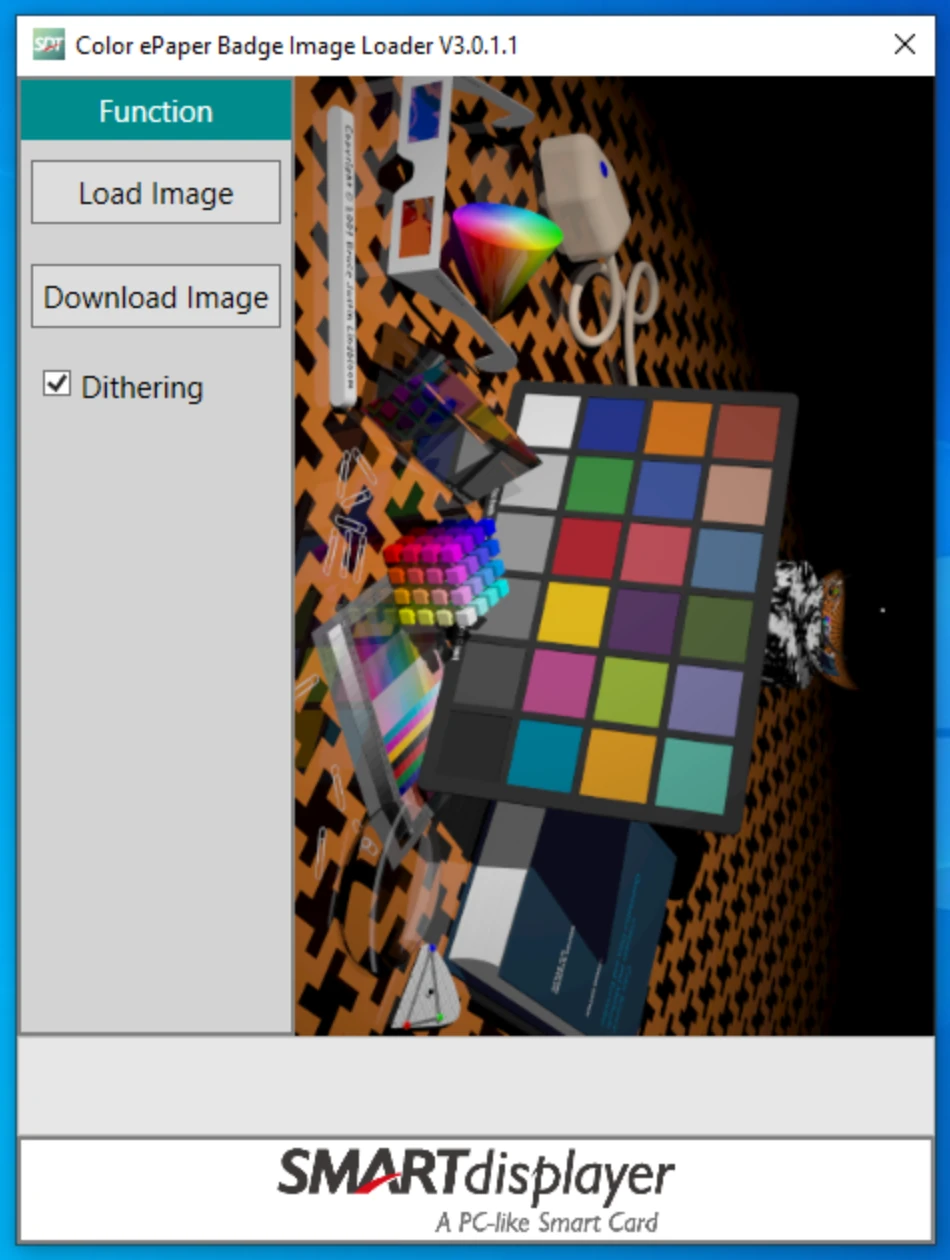 No image editing; it just resizes everything to 400x600. There's no badge design software or QR generator. And, to be honest, I think that's fine. You're better off designing your badges in dedicated software.
No image editing; it just resizes everything to 400x600. There's no badge design software or QR generator. And, to be honest, I think that's fine. You're better off designing your badges in dedicated software.
Unsurprisingly, the app wouldn't run under WINE in Linux. I used Oracle's VirtualBox. Note, the included software requires you to install Microsoft's .Net Windows Desktop Runtime 6 and the latest Microsoft Visual C++ Redistributable Version.
VirtualBox initially refused to see the USB peripheral. I had to unplug the reader, create a USB filter using 1fc9:0102, start the VM, and only then plug in the USB reader. Then it worked. Bit of a faff!
Pricing
I've got good news and bad news!
First, the bad. SmartDisplayer Technology Co are B2B sellers. They'll sell you a single badge for US$70 + shipping. If you're buying more than a thousand, the price drops to $65. The NFC reader is $120.
In terms of badge pricing, I think that's pretty fair. If you want to buy a demokit of just the screen, that'll cost you US$99 direct from eInk. So $70 full assembled is a bargain.
The good news? They'll shortly be bringing out a USB-C badge which doesn't require the NFC reader. The badge itself will be slightly smaller (and a little thicker). That should make it easier to update the badge on the fly - but possibly not as convenient if you're programming hundreds of them.
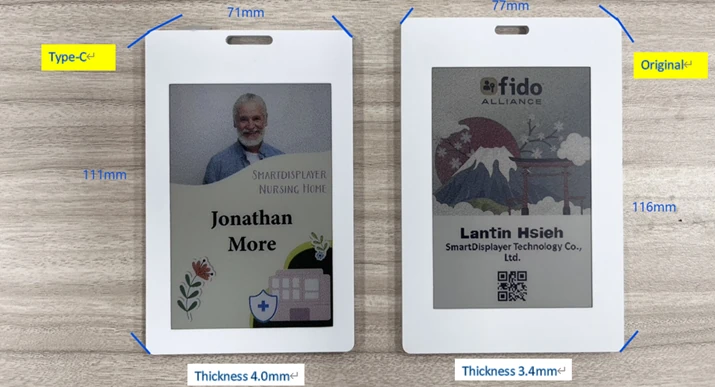
If you're buying in bulk, they will also do custom printing on the badge, and can replace the plastic with wood.
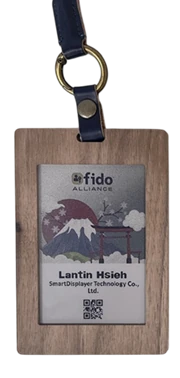
For more information, or to place an order, contact SmartDisplayer.
Verdict
If you want a fun lanyard which is easy to change, and can reproduce a decent range of colours, this is excellent. Ideally it would be easy to flash with a phone, but the supplied software is adequate.
The USB writer is a little bit clunky, but it holds the badge in place while data and power are transmitted.
I'm astonished by just how flat this badge is. SmartDisplayer cold-lamination process is incredible. The image is on the badge, not under it.
It looks stunning - a real premium product and the price reflects that.
As a personal gadget, I think it is great. But for other uses, I'm not so sure. Are you really going to be handing out $65 lanyards to all of your event attendees? Perhaps at a very expensive conference! But even then, you might want to take a deposit.
Anyone with a suitable reader can reflash a badge; there's no way to lock these. So they're not ideal for security.
If you attend lots of conferences, and are perpetually annoyed by ugly conference badges which misspell your name or don't have a personal QR code, these are a great (albeit pricey) gadget.
Thanks to SmartDisplayer for the review unit. Next time you see me at an event - please snap a photo of my badge!
2 thoughts on “Gadget Review: 6-Colour ePaper Name Badge”
@Edent Ohh, neat. The "Writer" appears to be a very standard USB class device for contactless smartcards. Which means, the badge is likely presenting as an ISO 14443 PICC.
Do you have a phone with "NFC" and can check whether https://play.google.com/store/apps/details?id=com.nxp.taginfolite can see the badge?
That would mean it should be possible to reprogram it without their writer, maybe with a phone or laptop built-in NFC/RFID interface. (Probably contingent on sufficient field strength/power transmission.)
NFC TagInfo by NXP - Apps on Google Play
| Reply to original comment on chaos.social
@edent
Sadly I can't get my phone to scan it - although I can scan other tags.
More comments on Mastodon.